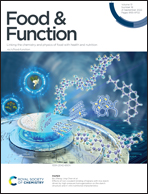Chewing differences in consumers affect the digestion and colonic fermentation outcomes: in vitro studies†
Abstract
It is important to understand variability in consumer chewing behavior for designing food products that deliver desired functionalities for target consumer segments. In this study, we selected 29 participants, representing the large range of chewing variation we had observed in 142 healthy young adults, and investigated the influence of chewing behavior on gastrointestinal digestion and colonic fermentation, using in vitro models and brown rice as a model food. Chewing behavior measured by video observations and chewing outcome differed widely between participants, resulting in large differences in the digestibility of carbohydrates. Inter-individual differences in chewing behavior and chewing outcome also significantly affected in vitro patterns of microbial composition and the production of organic acid metabolites, resulting from colonic fermentation, which is increasingly recognized to be important for human health. These digestion/fermentation outcomes were largely related with the chewing time per mouthful, proportion of bolus particles bigger than 2 mm and amount of saliva added to the bolus during chewing. No significant relationships were found with other chewing trajectory and oral physiological measures. These results suggest that modification of chewing may be an effective strategy to control blood glucose levels and to shape gut microbiota and their metabolites, without altering diets, and that further in vivo studies are warranted to confirm these in vitro findings.

- This article is part of the themed collection: Food structure, sensory perception, and nutrition


 Please wait while we load your content...
Please wait while we load your content...